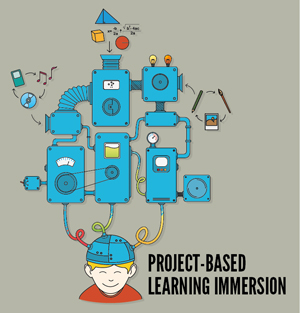I never realized that I had experienced project based learning before, but now that I think about it I have in some form or fashion. I mentioned in an earlier post about a professor of mine at Auburn University wanting us to do our work in topics we choose, because it helped us learn. That course was Topics in Mythology & Folklore,and it was taught by
Prof. Jeremy M. Downes. In that class he did something similar,in my mind, to what was discussed in the the interviews with Anthony Capps. In the first
video that I watched, he started mentioning about ensuring that the projects that you give the students are enough to keep them interested, and to also ensure that they are getting out of it what you want them to get. In the opening paragraph of his syllabus, Prof. Downes states "Though we'll do a fair amount of work in common, you'll also be encouraged to explore independently and in small groups in the myths and folkways of other cultures, perhaps even your own." I think this is where my first introduction to project based learning began.
So, beyond knowing where I have seen it, what else did I learn from these conversations? To be honest, I learned that project based learning is not that much different from normal teaching, but only in the preparation. It is completely different in execution and out come, but to ensure that you have the right amount of information and lessons to last an entire year is still there. I, honestly, thought it was simply giving students a project, like a work book page, and have them work in groups. I have learned that concept will not work! So, how is it done then? From what I gathered in the different videos, a teacher must be able to engage the students in ways that make it more interactive, while still meeting the normal requirements that the Educational State Board requires. Anthony Capps gave the example of creating videos as if the students were from Afghanistan. To do so, however, they must first research and understand that culture, and then were allowed to creature a video presentation on what they decided to learn about. The project was the video, but the learning was the research and gathering of information, but done in a way that seemed less like work and more like a project.
I also learned that, like life, not everything goes as planned. So teachers have to be adaptive, and have back up or side plans to ensure that their students do not lose out on education when technology does not work (as it is one to do). However, the most important aspect about being adaptive is that a teacher must not be afraid to learn, and to step back and realize that s/he can do better then they are doing now. There is no shame in realizing that your thoughts are not going as you thought, and you have to go back to the drawing board. Nothing is perfect the first time, especially in something as quickly evolving as project based learning.
So to sum it up. What did I learn? Project based learning is an ever evolving view point on teaching that requires a lot of work, but is a fun system of learning that rewards both teacher and student in the end.









